 |
|
|
|
| HISTORY
The first inhabitants on Naxos were Thracians who brought with them the worship of Dionysos. They followed by Carians and Ionians. Naxos began to proper during the Mycenaean era and reached its peak in the 7th and 6th centuries BC. |
|
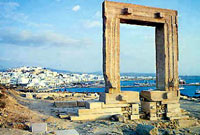 |
|
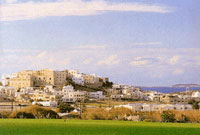 |
|
Dominated in quick succession by Macedonians, Ptolemies, Egyptians, Rhodians and Romans, it suffered constant pirate raids under the Byzantines. In 1207 Marco Sanudo captured the island and made it the seat of his dukedom (the Duchy of Naxos or Archipelago). Laid waste by Barbarossa in 1537, from 1566 to 1579 it belonged to losiph Naxis and thereafter was occupied by the Turks. Naxos was liberated with the rest of the Cyclades. |
|
| SIGHTSEEING
Its rich history has left Naxos many monuments from every era. On the west coast lies the capital, dominated by its Venetian castle. Built in 1207 by Marco Sanudo, it was populated largely by Catholics. Inside the castle walls are the Ursuline and Capuchin monasteries as well as the old school of commerce, now the archeological museum. |
|
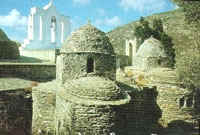 |
|
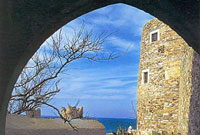 |
|
The Byzantine and Folk Museum is housed in a restored tower. The castle also contains the Catholic cathedral, and Byzantine churches are scattered all over the town. One can still see the huge doorway of the 6th century temple of Apollo standing free on the islet at the entrance to the harbor. Excavations at Grotta and Aplomata have unearthed early Cycladic and Geometric finds proving that Naxos was one of the centers of Cycladic civilization. |
|
| Agidia has remains of an ancient temple. One of the most beautiful areas in Naxos is the Tragaia in the interior. There are several Venetian towers on the island (Halki, Potamia, Polochni), while Moni claims the oldest Byzantine church of Our Lady Drosiani (6th c.). |
|
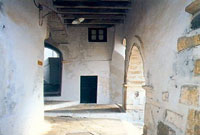 |
|
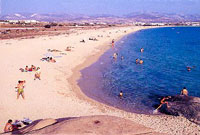 |
|
Near Floti there is a hill called Za with a cave dedicated to the cult worship of Bacchus (local tradition maintains that it was the birthplace of Zeus). At Apeiratho, which has a strong Venetian atmosphere, are several towers with names like Sommaripa, Crispi and Sforza. The museum there contains interesting early Cycladic finds. |
|
| There are more towers - Della Rocca, Palaiologos and Barozzi by name - at Sagri and further south the ruined medieval castle of Apalyros. Apollona is famous for its colossal kouros of the god Apollo (7th c. BC). Naxos' superb beaches are on the west side of the island, which has a good road network and tourist accommodations. It has much to offer the visitor who loves to explore. |
|
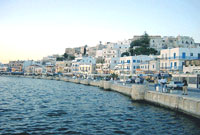 |
|
|
 |
|
|
|